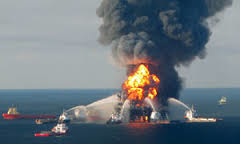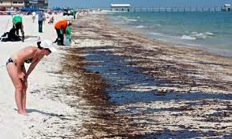"By 2030 China would need 98 million barrels of oil a day. The world is currently producing 85 million barrels a day and may never produce much more than that...What China is teaching us is that the western economic model—the fossil-fuel-based, automobile-centered, throwaway economy—is not going to work for China. If it does not work for China, it will not work for India, which by 2030 may have an even larger population than China. Nor will it work for the other 3 billion people in developing countries who are also dreaming the "American dream." And in an increasingly integrated global economy, where we all depend on the same grain, oil, and steel, the western economic model will no longer work for the industrial countries either..."
—Lester Brown, Plan B 3.0

For eighty-seven agonizing days in 2010, the world waited for British Petroleum to stop an oil gusher on the sea floor that, before it was finally capped, spewed over two-hundred million gallons of crude oil into the waters of the Gulf of Mexico just south of Mississippi and Alabama. An explosion and fire aboard the Deepwater Horizon, a floating oil drilling platform, caused the rig to capsize and sink, damaging the wellhead on the sea floor; haunting video footage of the gusher created much anxiety that the marine environment of the Gulf, and the beaches and estuaries along its shores would be damaged for many, many, years.

This tragic event, which has already proven to be a vast environmental catastrophe, nevertheless provides a number of insights with relevance to the AP Human Geography course at MAST@FIU. First, it serves to emphasize and expand upon Lester Brown's warning: it was an accident waiting to happen, brought about by market demands few anticipated a generation ago. Twenty-five years ago, China was sealed off from the world's economy by poverty and political ideology; India, too, calcified by its caste system and by its inefficient bureaucracy was a relatively small market-demander of the world's energy resources. Since then, however, China's 1.1 billion people, and India's 1.3 billion people—one-third of the population of Earth—have increasingly become part of the world's global economic marketplace. The increase in demand for energy pushed BP to the edge of what is currently technologically possible, and they failed: Deepwater Horizon was the worst oil spill ever. Its long-term consequences for the ecosystem of the Gulf, including its commercial and recreational economy are unknown.

Global market forces are driving other resources toward their limits: many of the world's important fisheries are in decline, deforestation and desertification are accelerating, sources of fresh water, both underground and at the surface, are drying: as an example, you may have seen dynamic pictures of people white water rafting on the Colorado River—today, in spite of those images of powerful, roaring water, the Colorado River no longer reaches the sea: it is diverted for agricultural and urban use to such a degree that it is quite literally all used up.
I have built this AP Human Geography course around a 'grand narrative': the world's people have, over the past several thousand years created a number of global world systems—economic, political, and social institutions—that have become increasingly coherent and polarizing but shifted from the east and west pattern that dominated since the end of World War II. At the same time, the world is growing more populous and more wealthy, the most alarming consequence of which is the increased demand for natural resources from an already-strained closed system. In the end, the course is about how people live on the Earth, not how people should live on the Earth. Each generation decides that for itself.
